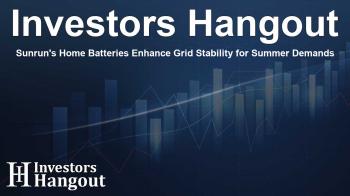Sunrun's Home Batteries Enhance Grid Stability for Summer Demands

Sunrun's Significant Contribution to Energy Grid Reliability
In a major step towards enhancing the nation’s energy resilience, Sunrun (Nasdaq: RUN) is activating a substantial part of its home battery fleet this summer. With over 130,000 batteries coming online, Sunrun aims to assist the power grid during periods of peak electricity demand. This strategic move supports America’s need for reliable energy, especially as usage surges during the hotter months.
Meeting the Energy Demands of a Growing Nation
As the country grapples with an increase in energy consumption due to booming sectors like manufacturing and data centers, Sunrun is positioned to play a crucial role. The company’s CEO, Mary Powell, remarked on the rising energy demands and emphasized how Sunrun is effectively integrating solar energy with storage solutions to add significant capacity to the grid. With the ability to dispatch up to 650 megawatts of peak power—a volume capable of supplying energy to approximately 480,000 homes—Sunrun is taking decisive action to address this soaring electricity need.
The Impact of Sunrun's Storage Strategy
Sunrun’s innovative storage-first approach has elevated it to one of the premier energy storage operators in the United States. The company currently boasts nearly one gigawatt of installed battery capacity, equivalent to that of a nuclear power plant. This strategic emphasis on energy storage not only solidifies Sunrun's market position but also furthers its mission of ensuring sustainable energy access for as many households as possible. Observations indicate that Sunrun’s integration of storage with new solar installations is becoming increasingly common—approaching a 70% attachment rate in the first quarter this year, highlighting the growing popularity of home battery installations across the country.
Recent Contributions to Grid Reliability
Sunrun’s dispatchable power plants have recently supplied essential energy to various states facing demanding conditions:
Texas
During unusually high temperatures, Sunrun provided critical energy support, helping customers manage their electricity costs.
Arizona
The state’s major utility provider requested assistance from Sunrun multiple times as temperatures reached uncomfortable highs.
California
Sunrun’s residential battery fleet delivered an average of over 300 megawatts during peak demands in California, reinforcing the grid's reliability.
New York
Sunrun activated the largest residential battery plant in New York several times to alleviate grid stress during peak usage periods.
Puerto Rico
Amid challenges from centralized power sources, Sunrun's system was called upon to provide crucial support during 26 emergency events this year.
Preparing for Future Challenges
Looking ahead, Sunrun is working closely with utility companies to anticipate future energy demands stemming from rising temperatures. Utilities in New York and Puerto Rico have already reached out to prepare for potential power dispatches as they brace for heatwaves.
Collaboration with Utility Partners
Sunrun collaborates with diverse electric utilities through 17 dispatchable power plant programs designed for grid reliability enhancement. This unique ability allows the company to deploy significant battery resources quickly, providing essential grid services to improve reliability and prevent blackouts. Through these programs, Sunrun not only supports the grid but also assists utilities in postponing costly infrastructure investments, ultimately benefitting families relying on stable electricity.
Conclusion: The Importance of Subscription Energy Models
Central to Sunrun's ability to manage and deploy energy resources is its subscription model, which facilitates the aggregation of home batteries. With the backing of the 48E investment tax credit, Sunrun is scaling its infrastructure to tackle the impending electricity supply dilemma effectively. By reducing financial barriers associated with solar energy adoption, Sunrun is helping families access cleaner, more sustainable energy solutions with peace of mind.
Frequently Asked Questions
What is Sunrun's recent initiative regarding home batteries?
Sunrun is activating over 130,000 home batteries this summer to enhance the reliability of the power grid.
How much power can Sunrun dispatch to the grid?
Sunrun has the capability to dispatch up to 650 megawatts of peak power, sufficient to power 480,000 homes.
What does Sunrun’s storage-first strategy position them as?
This strategy has established Sunrun as one of the top energy storage operators, with nearly one gigawatt of installed battery capacity.
In which states has Sunrun provided essential energy recently?
Sunrun has recently dispatched energy in Texas, Arizona, California, New York, and Puerto Rico to assist with peak demand loads.
How does Sunrun's subscription model affect energy access?
Sunrun's subscription model allows for easier aggregation and management of home batteries, making renewable energy more accessible to homeowners.
About The Author
Contact Owen Jenkins privately here. Or send an email with ATTN: Owen Jenkins as the subject to contact@investorshangout.com.
About Investors Hangout
Investors Hangout is a leading online stock forum for financial discussion and learning, offering a wide range of free tools and resources. It draws in traders of all levels, who exchange market knowledge, investigate trading tactics, and keep an eye on industry developments in real time. Featuring financial articles, stock message boards, quotes, charts, company profiles, and live news updates. Through cooperative learning and a wealth of informational resources, it helps users from novices creating their first portfolios to experts honing their techniques. Join Investors Hangout today: https://investorshangout.com/
The content of this article is based on factual, publicly available information and does not represent legal, financial, or investment advice. Investors Hangout does not offer financial advice, and the author is not a licensed financial advisor. Consult a qualified advisor before making any financial or investment decisions based on this article. This article should not be considered advice to purchase, sell, or hold any securities or other investments. If any of the material provided here is inaccurate, please contact us for corrections.

